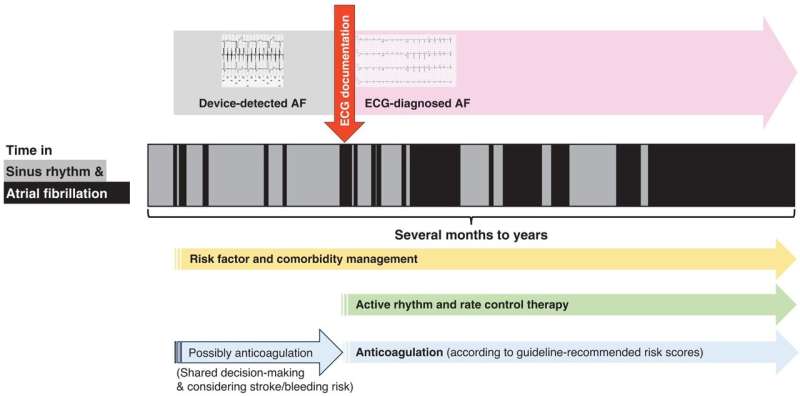This article has been reviewed according to Science X's editorial process and policies. Editors have highlighted the following attributes while ensuring the content's credibility:
fact-checked
proofread
Experts give recommendations for longer and better lives for patients with atrial fibrillation

An international panel of experts published recommendations to improve management of atrial fibrillation (AF). The position paper summarizes the results of the 9th AFNET/EHRA consensus conference—a two-day expert meeting which was jointly organized by the German Atrial Fibrillation Network (AFNET) and the European Heart Rhythm Association (EHRA) in Münster, Germany, in September 2023. Today the consensus report was presented at the EHRA congress in Berlin by Prof. Dominik Linz, Maastricht, The Netherlands, and simultaneously published in Europace.
Atrial fibrillation (AF) is the most common arrhythmia and a growing health problem in an aging society. It affects several million people in Europe and worldwide.
During the 9th AFNET/EHRA consensus conference 83 international interdisciplinary scientists pooled their knowledge on AF management and research and discussed new insights and treatment options.
Prof. Linz, first author of the paper, explained, "After two days of fruitful discussion, we merged our findings. The essence of the meeting was summarized in five recommendations."
- Active rhythm management should be part of the default initial treatment for all suitable patients with AF.
- Patients with device-detected AF have a low burden of AF and a low risk of stroke. Anticoagulation prevents some strokes but also increases major but non-lethal bleeding.
- More research is needed to improve stroke risk prediction in patients with AF, especially in those with a low AF burden. Biomolecules, genetics and imaging can support this.
- The presence of AF should trigger systematic work-up and comprehensive treatment of concomitant cardiovascular conditions.
- Machine learning algorithms have been used to improve detection of AF and can help to prevent development of AF. Cooperation between clinicians and data scientists is needed to leverage the potential of data science applications for patients with AF.
Prof. Paulus Kirchhof, Hamburg, Germany, one of the four chairpersons of the conference and board member of AFNET, concluded, "Combining active rhythm control, anticoagulation, rate control, and therapy of concomitant cardiovascular conditions can improve the lives of patients with AF. A low AF burden is associated with low rates of stroke and heart failure. Reducing AF burden is developing into a therapeutic goal in patients with AF."
Prof. Andreas Goette, Paderborn, Germany, also chairman of the conference and AFNET board member, stated, "We are curious to see whether our recommendations will be incorporated into the upcoming AF guidelines and change clinical practice."
More information: Paulus Kirchhof et al, Longer and better lives for patients with atrial fibrillation: The 9th AFNET/EHRA Consensus Conference, Eurospace (2024). DOI: 10.1093/europace/euae070



















